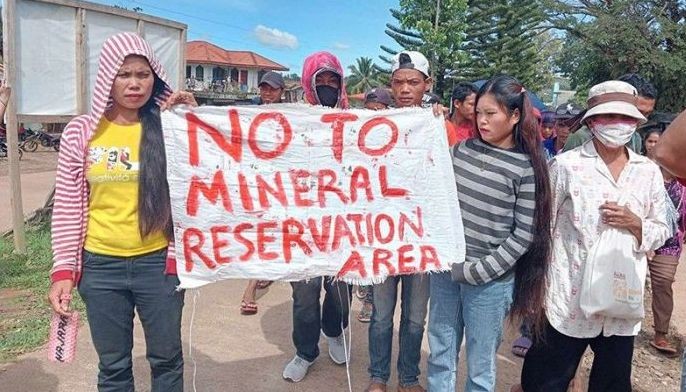MANILA, Philippines — The Lambangian and Teduray indigenous communities, along with migrant settlers in Maguindanao del Sur, have voiced their opposition to a proposed mineral reservation area, fearing the potential destruction of their forests and traditional grounds.
Around 300 indigenous peoples and migrant settlers held a protest Thursday in front of the municipal gym in South Upi, according to the group Task Force Bantay Kalikasan (TFBK).
A 3,566-hectare mineral reservation is being proposed to be established within the Teduray and Lambangian Ancestral Domain Claim (TLADC), which has been in process at the National Commission on Indigenous Peoples since 2005.
The proposed mineral reservation area will cover Mt. Kulayan and Mt. Dakeluwan, which are sacred areas for the indigenous peoples.
“The burial grounds of our ancestors and the remaining forests such as Uga, Fengalungon and Kinemkem are within the proposed mineral reservation area. What will happen if they eventually mine the area? What will happen to the next generation?” Arman Calatungan, a Lambangian youth from South Upi, said.
According to TFBK, the Bangsamoro government’s Ministry of Environment, Natural Resources and Energy-Mines and Geosciences Services (MENRE-MGS) produced a geological mapping report that showed findings of gold, copper, zinc and limestones in the municipalities of Upi and South Upi.
Most of these minerals are known to be extracted through the open-pit mining method.
Public hearing
Potential mining areas with known strategic mineral reserves and resources can be declared as mineral reservations for the development of strategic industries after proper consultation with all concerned stakeholders.
TFBK said that a public hearing was set Thursday, but it turned into an information, education and communication campaign “with limited number of participants” organized by Geospatial Environmental Consultancy Services, which is working in collaboration with the MENRE-MGS.
Then, the IEC campaign was canceled.
Mary Joie Meliz, a Teduray woman leader from South Upi, said the change in the program was a “way to confuse” the communities and make it difficult for them to express their opposition to the mineral reservation proposal.
TFBK chairperson Titay Bleyen Santos Unsad said the MENRE-MGS is violating the process of seeking the free, prior and informed consent from the affected Lambangian and Teduray indigenous communities.
“We call on the government to recognize our rights,” Santos Unsad said.


